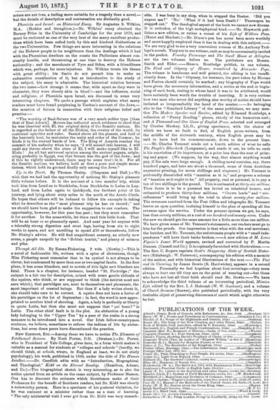Barney Prize in the University of Cambridge for the year
1870, and must be reckoned as one of the very best of the many excellent produc- tions which have been called forth by this and kindred distinctions at the two Universities. FOW things are more interesting in the relations of the Hebrew people to its neighbours than the dealings which it had with the Phoenician dwellers on the coasts the Philiatinea almost con- stantly hostile, and threatening at one time to destroy the Hebrew nationality ; and the merchants of Tyre and Sidon, with a friendliness which was, perhaps, far more injurious. Mr. Wilkins treats his theme with great ability ; his limits do not permit him to make an exhaustive examination of it, but as introductive to the study of the subject, his essay is admirable. The historical relation between the two races—how strange it seems that, wide apart as they were in character, they were closely akin in blood !—and the influence, social and religious, of Phoenicia upon Israel, are discussed in some very interesting chapters. We quote a passage which explains what many readers must have found perplexing in Tacitus'a account of the Jews,— the mention of Saturn in connection with their religions belief and practice:— " The worship of Baal-Saturn was of a very much nobler type [than that of Baal-Adonis]. Movers has collected much evidence to show that he was identical with El, the original deity of the Semitic nations. He is regarded as the father of all the Elohim, the creator of the world, its continual upholder and ruler. Seated above all the planets, and lord of the heavenly host, he maintains the unity and order of the Cosmos ; he binds it in the eternal bands of law. The King of Assyria reaches the summit of his audacity when he says, 'I will ascend into heaven, I will exalt my throne above the stars of El, I will make myself like to El-
Eluin ! An all but universal opinion among the ancient pagans, origin- ating probably in Egypt, was that Saturn was the god of the Jews ; and
if this be rightly understood, there may be some trues in it. For all the Semitic nations, we believe, held at first a pure and simple mono- theism, which held its ground finally only among the Jews."
































 Previous page
Previous page